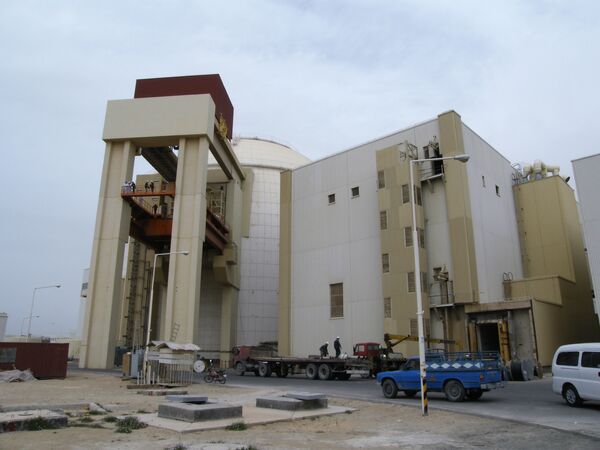Russia is completing final preparations to load low-enriched uranium fuel into Iran's first civilian reactor at the Bushehr NPP later on Saturday.
If the operation goes smoothly, Bushehr will be qualified as an operational nuclear power plant. It is expected to start producing electricity late this year or early next.
A Russian delegation headed by Rosatom chief Sergei Kiriyenko will attend the launch ceremony. The Iranian delegation will be led by Ali Akbar Salehi, vice president and Director of the Atomic Energy Organization of Iran (AEOI).
Western powers suspect Iran of pursuing nuclear weapons under the guise of its nuclear program, a charge Tehran strongly denies, saying the program is aimed at the peaceful generation of civilian energy.
On June 9, 2010, the UN Security Council approved a fourth round of sanctions against Iran over its nuclear program, including tougher financial controls and an expanded arms embargo, as well as an asset ban on three dozen companies and a travel freeze on individuals.
Later, the United States and the European Union imposed extra sanctions against Iran, including tougher restrictions on the energy sector and a tougher trade embargo.
The construction of the Bushehr facility was not affected by the sanctions.
Russia has said that all the fuel for Bushehr will be supplied by Russia and all the spent fuel will be returned to Russia. The fuel deal made the project acceptable to Washington and Russian Foreign Minister Sergei Lavrov said earlier this week that the Bushehr plant contributes to the nonproliferation regime.
However, Salehi said on Friday the Islamic republic does not necessarily have to buy fuel from Russia.
"Enrichment [of uranium] for producing fuel for the Bushehr plant and other plants will continue," he was quoted as saying by state news agency IRNA on Friday.
"The Bushehr plant has a lifespan of 60 years and we plan to use it for 40 years. Suppose we buy fuel for 10 years from Russia, what are we going to do for the next 30 to 50 years?" the Iranian official added.
The construction of Iran's first nuclear plant was begun in 1975 by several German construction companies. They pulled out following a U.S. embargo on hi-tech supplies to Iran after the 1979 Islamic Revolution and the subsequent U.S. Embassy siege in Tehran.
Russia signed a contract with Iran to complete construction in February 1998.
Russian experts praise the end of Bushehr construction as another successful example of Russian nuclear technologies.
"We undertook to do what others failed. And we successfully coped with the difficulties. Rosatom demonstrated its highest competence while building the Iranian NPP," said Valentin Mezhevich, deputy chairman of the Federation Council's fuel and energy committee.
Alexander Uvarov, who heads the Atominfo Center NGO, said Bushehr NPP was a "unique" project as Russian specialists had to assemble together Russian and German equipment.
"Only Russian specialists could bring this project to life. The German reactor design was integrated with a Russian PWR [pressurized water reactor]. They used equipment which was stored at the construction site for a long period, and its reliability had to be checked,"
"I'm sure that there will be no such example of integrating various technologies in the foreseeable future," the expert said.
The head of the Russian union of energy efficiency, Semyon Dragulsky, added that the successful completion of the Bushehr project would strengthen Rosatom's positions at other international tenders to build nuclear power plants.
BUSHEHR, August 21 (RIA Novosti)


